College of Science, Engineering & Technology
CSET researcher driven by innovation
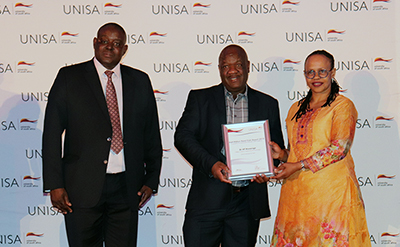
Harry Bopape (Director: Research Support) and Prof Thenjiwe Meyiwa (Vice-Principal: Research, Postgraduate Studies, Innovation and Commercialisation) congratulate Dr Alex Kuvarega (College of Science, Engineering and Technology) (centre) on his 2019 Half Million Rand Club Award.
Dr Alex Kuvarega of the College of Science, Engineering and Technology (CSET) is grateful that Unisa recognises the efforts of its researchers. Kuvarega was honoured as an NRF C-Rated Researcher (C2) and as a member of the Half Million Rand Club at the 2020 Research & Innovation Awards.
Kuvarega is honoured to be a recipient of the Half Million Rand Club Award, which is a recognition for his successful application for external funds of at least half a million rand. "This will go a long way in assisting postgraduate students realise their dreams through research and training. At CSET, one of the research themes is innovation and capacity building in science and technology. It can only be realised through external leverage funding."
His Water Research Commission SA Grant was awarded for process innovation through new technologies for ensuring water and environmental security. The focus is on improving water quality and reducing water treatment costs through piloting innovations and appropriate novel technologies that could be taken up by the sector and beyond.
Having lectured at a few African universities, he has realised that lack of research facilities and research funds can have a negative impact on one’s research career. Kuvarega is passionate about assisting postgraduate students realise their research dreams and capabilities. He conducts research that adds value to Africa’s development and to the global society. For him, research is about innovation - finding solutions to problems for which there are no recipes.
Using sun to clean water
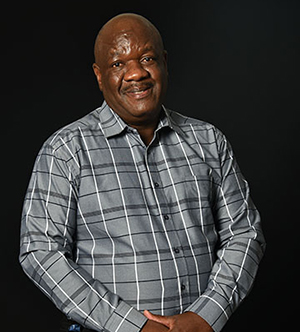
Dr Alex Kuvarega (College of Science, Engineering and Technology, Unisa)
Kuvarega’s research focuses on the integration of advanced oxidation processes (AOPs) with membrane technology through development of nano-structured materials and fabrication of inorganic membranes for the removal of emerging pollutants in water. The main objective is to use abundantly available solar light to activate the photocatalysts and the oxidants to produce highly reactive radicals that are non-selective towards oxidative degradation of organics. Carbon membranes would then be used to remove the residual by-products from the AOPs. Target pollutants include pharmaceuticals and personal care products, dyes and pesticides.
Expressing his gratitude for being recognised as an NRF C-Rated Researcher (C2), Kuvarega says the NRF rating is a tool for benchmarking the quality of South African researchers against the best in the world. "Achieving a rating is a significant accomplishment that attests to the recognition as an established researcher with a sustained recent record of productivity in the field of research. A C2 rating means that I may enjoy some international recognition for the quality and impact of my recent research outputs. I am grateful for this recognition, which I hope will add value to my CV and will also be an advantage when applying for research funds."
Kuvarega urges upcoming researchers to draw inspiration from the available resources at Unisa in order to take research to a new level. According to him, in these days of increased competition, the ability to survive in the science and engineering environment can only be mastered through learning. He believes that upcoming researchers need to be motivated to cultivate a sense of curiosity, taking pride in doing the right thing and nurturing realistic ambitions.
* By Nancy Legodi, Acting Journalist, Department of Institutional Advancement
Publish date: 2020-03-20 00:00:00.0


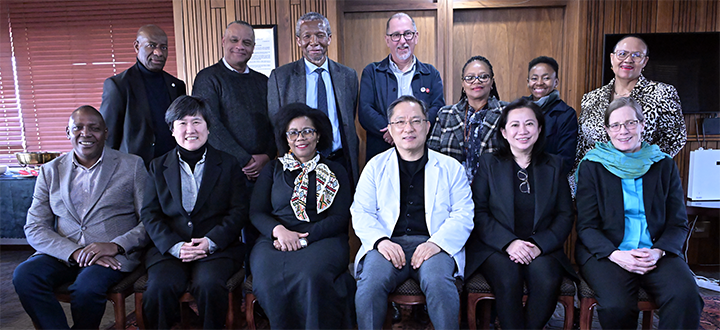 Unisa wins bid to host IAMS General Assembly
Unisa wins bid to host IAMS General Assembly
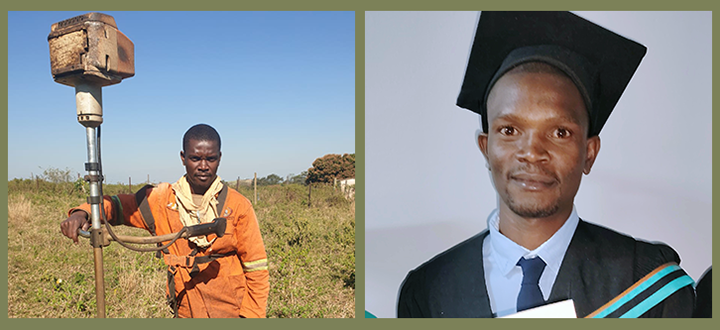 Cutting grass by day, pursuing Unisa studies by night
Cutting grass by day, pursuing Unisa studies by night
 Unisan’s research set to improve accident records management through AI
Unisan’s research set to improve accident records management through AI
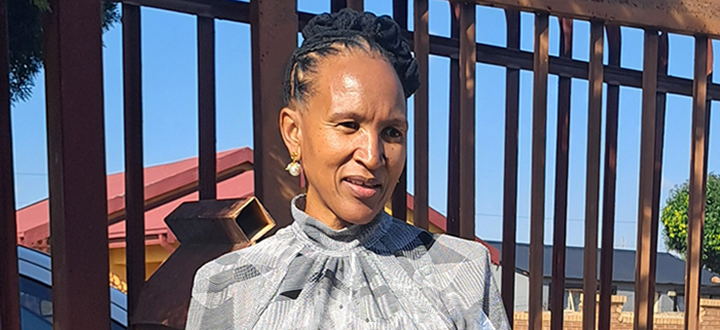 Koma e wetse: When tradition meets the harsh realities of modern livelihoods
Koma e wetse: When tradition meets the harsh realities of modern livelihoods
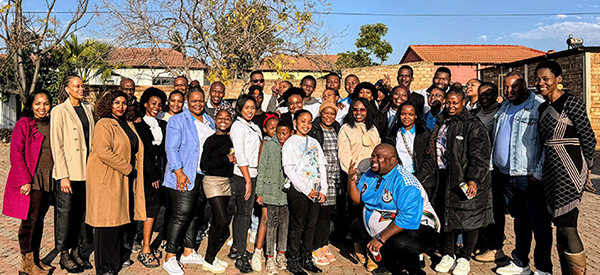 Imbizo inspires youth
Imbizo inspires youth